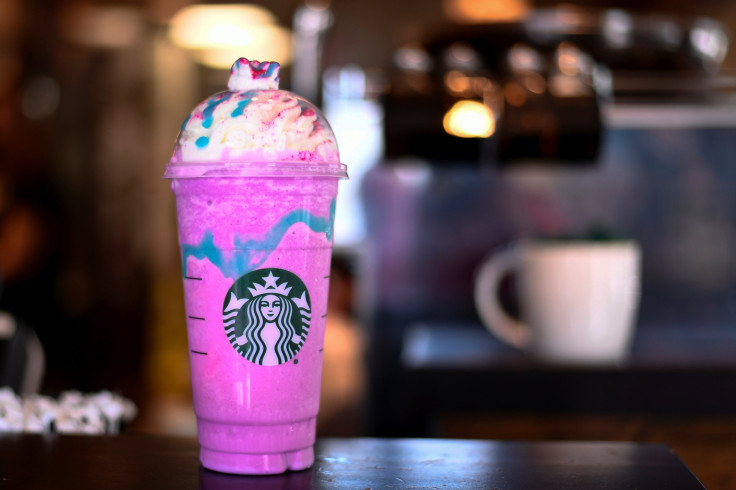Starbucks' Unicorn PR, Marketing Win: Like It Or Not, New Frappuccino Got People Talking

Starbucks (NASDAQ:SBUX), with the success of its Unicorn Frappuccino, has become one of a handful of companies that have managed to master the art of capturing public attention. Call it car-crash public relations or liken it to a person wearing a bright pink tuxedo at a black-tie affair, but the brightly hued, super-sugary drink was simply too bizarre to ignore.
The Unicorn Frappuccino joins products like KFC's Double Down (the sandwich that used fried chicken as bread), Tacos Bell's original Doritos Locos Taco, and Pizza Hut's pizzas with a hot-dog-stuffed crust as food spectacles that get people talking.
It's a formula designed not so much to create good food (though all the items mentioned above have their devoted fans), but to generate attention.
The Unicorn Frappuccino brought Starbucks a stunning amount of free media coverage and turned customers into a social media army that fueled attention for the limited-time offering, driving traffic to stores so people could buy the color-changing, flavor-changing beverage before it sold out.
What does this do for Starbucks?
Obviously the coffee chain got tens of millions of dollars’ worth of free advertising in the form of media coverage and social media shares. But that's only a small part of the benefit the Unicorn Frappuccino brought to the company.
Perhaps the most important thing the frozen beverage did for Starbucks is let the public know that the company has non-coffee-based offerings. The sheer amount of social media pictures with young kids drinking it eventually conveyed that message.
The Unicorn Frappuccino not only brought in lapsed Starbucks customers or increased checks from regulars, it opened up a new audience for Starbucks. This particular drink is only a limited-time offering, but the chain has creme Frappuccinos (which do not contain coffee) on its regular menu, along with hot chocolates, caffeine-free teas, and other kid-friendly beverages.
The gift that keeps on giving
The various Yum! Brands chains have not only scored with some attention-getting products, they have also built up expectations. People are looking for what they will do next and that brings both media as well as social media attention to whatever their newest stunts are.
Starbucks may not be able to top the success or the bizarre nature of its color-changing, flavor-changing frozen drink, but more people will be looking for whatever it offers going forward. Starbucks, at least partly from customer-created "secret menu" offerings, has a deep bench of non-coffee-based, potentially attention-getting drinks it could cycle onto its menu as a way to build upon the too-young-for-caffeine audience it now has a toehold in.
The American public has shown a willingness to fall for train-wreck marketing. It's why we watch Dancing with the Stars and why many of us can't look away from whatever the Kardashian sisters might be doing. Combine two foods that don't normally go together or find a way to create an over-the-top edible or drinkable spectacle and people will come.
Starbucks has captured the public's attention with the Unicorn Frappuccino and it should be able to hold onto it with whatever its next stunt drink offer is. That should grow the chain's audience and, of course, give it a way to spike sales during a slow period when it inevitably brings the beverage back in the future.
Forget Starbucks: "Total conviction" buy signal issued
The Motley Fool's co-founders, David and Tom Gardner, rarely agree on a stock. But when they do, their picks have beaten the market by nearly 10x on average.*
That's why many investors consider their joint stamp of approval to be a "total conviction" signal to buy. The Motley Fool recently announced a new "total conviction" stock…and it wasn't Starbucks!
Click here to learn more about the stock.
*Returns as of April 13, 2017.
Daniel Kline has no position in any stocks mentioned. The Motley Fool owns shares of and recommends Starbucks. The Motley Fool has a disclosure policy.
© Copyright IBTimes 2025. All rights reserved.





















